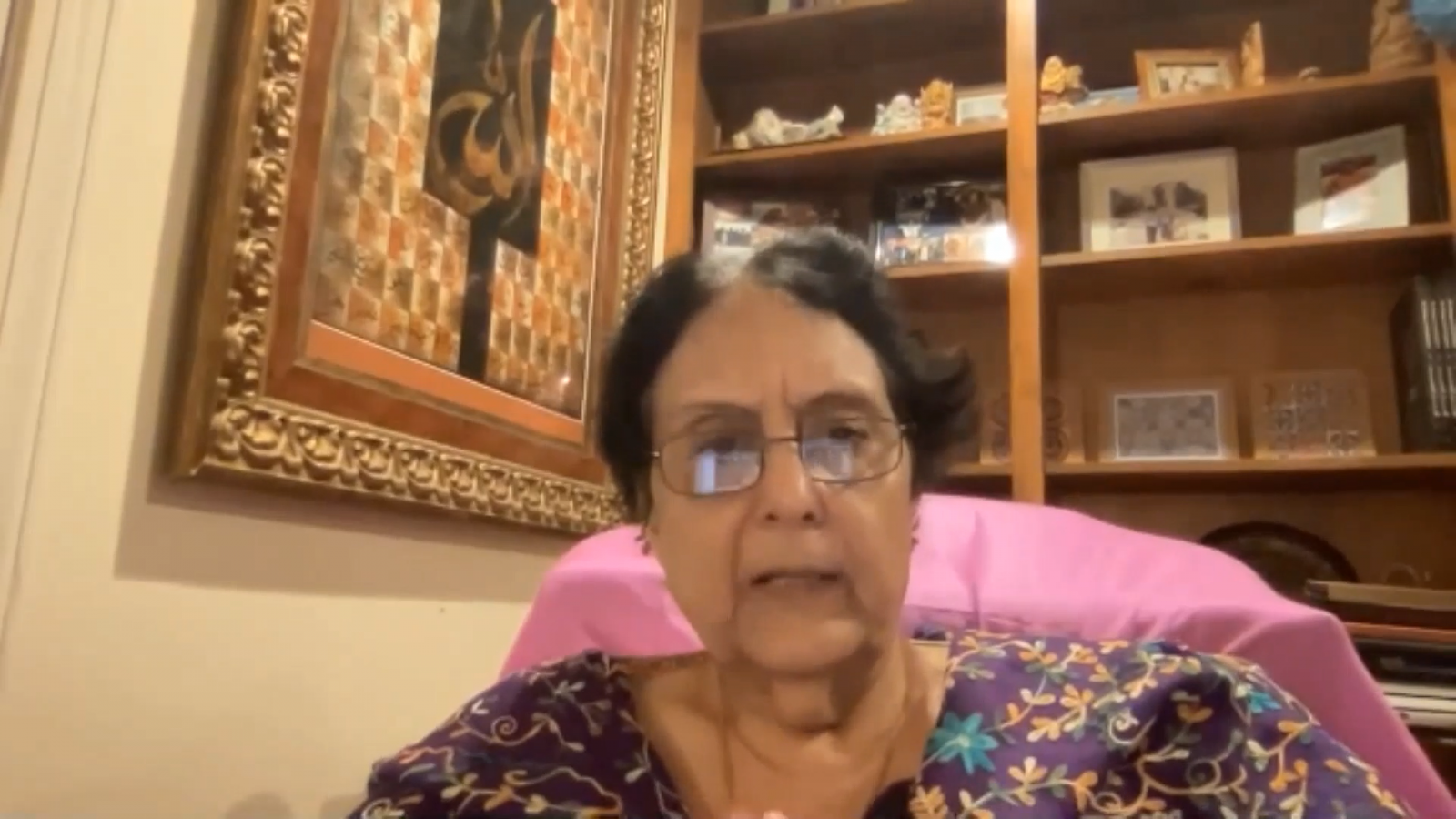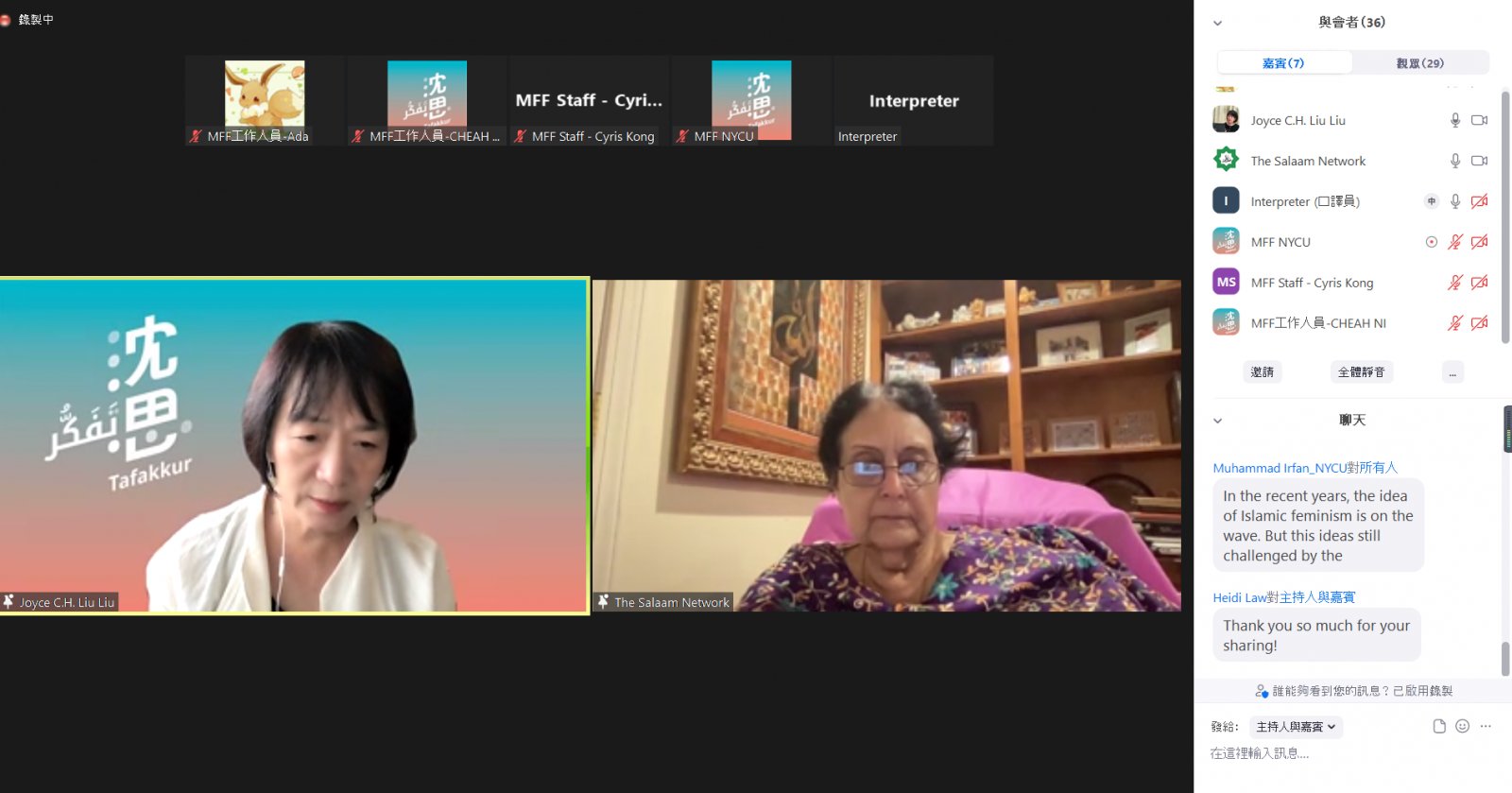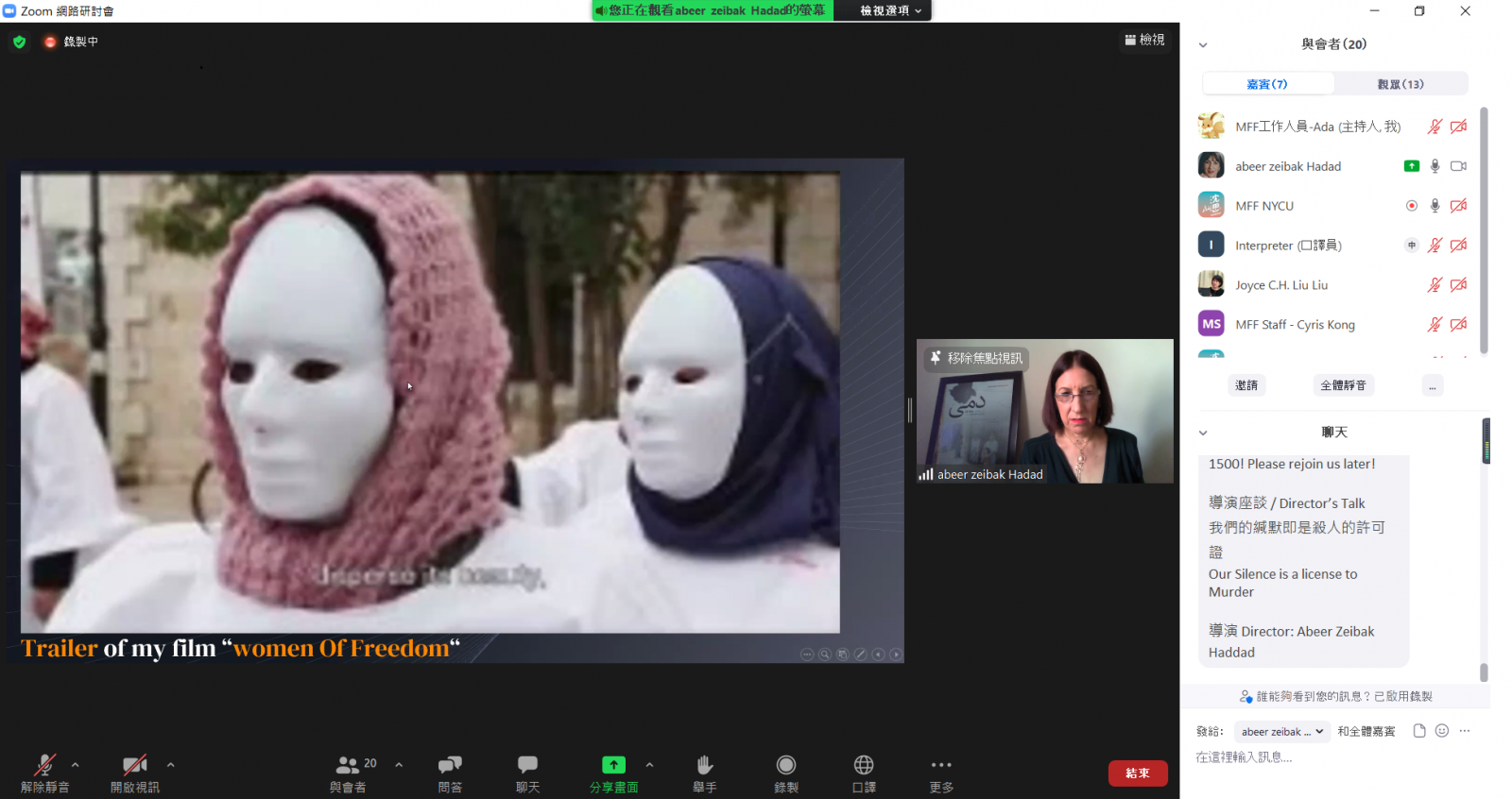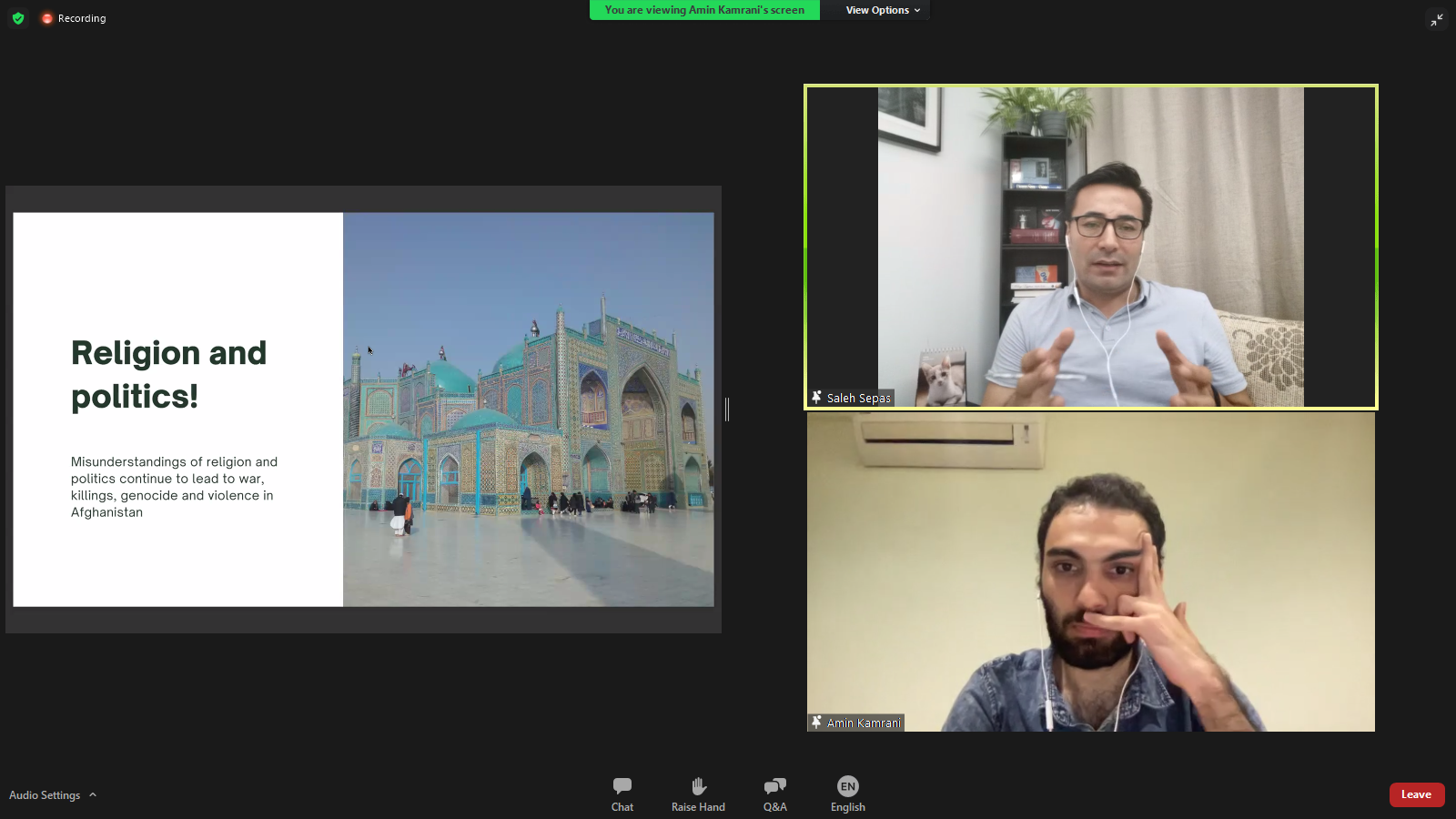

Activity Report: The Tafakkur ICCS-NYCU Muslim Film Festival DAY 2
2022-02-09
The Tafakkur ICCS-NYCU Muslim Film Festival DAY 2-REPORT
Date: 2021/10/23
Venue: Zoom webinar
Text / Irfan Muhammad (M.A. Student at IACS-UST at NYCU)
Honor killing are killings carried out with reasons to maintain the dignity and honor of the family. Ironically, this practice mostly targets women and is carried out by their kin. Although it occurs in many parts of the world with various religious backgrounds, in the contemporary context, this practice is still found in societies with a Muslim majority. Reports of this practice are common in countries such as Iraq, Palestine, or Saudi Arabia in the Middle East or Pakistan or Afghanistan in South Asia, making it unsurprising when people associate this practice with Islam.
The second day of the Muslim Film Festival features "Women of Freedom" (2016), a documentary film that reveals in detail the practice of honor killings in Palestinian society that is produced by Abeer Zeibak Haddad. This film portrays Palestinian women who are frequent targets of attempts on their lives where their parents and relatives endorse these acts of violence in reaction to what they consider a slight to their honor.
In the film, data shows that a whopping 55% of young Palestinians support the murder of women, and 58% think that when women are murdered it’s their fault. More often than not, the victims of these brutal acts end up dead, disfigured, or will be on the run for the rest of their lives. This film expresses the feelings of all parties involved, not only from the perspective of the victim but also the bereaved family and even the perpetrator.
Abeer then documents her visits to several women's advocacy organizations in Palestine that track how many reports they received on this case. With the progress of time, the practice of honor killing itself has now been directly criticized by many Palestinians, especially the younger generation. Their refusal of this practice is carried out through demonstrations or theatrical and artistic actions in public spaces.
The screening of “Women of Freedom” was followed up with the director’s talk in the afternoon. It was made known that honor killing happens in many other places in the world including Europe and the United States. The UN estimates that about five thousand women are murdered every year around the world in connection to this violation of family honor. Her film wishes to encourage a discussion on this silenced and controversial problem that inflicts pain on many societies and aims to unravel the circumstance that led to this troubling phenomenon.
In Israel, Abeer's home country, about ten Arab women are murdered every year because of this practice. The first time she heard about the honor killing in her society was when she was 10. There was a girl from her hometown in Nazaret who was pregnant out of wedlock. She then died in her own grandmother’s hands who poured mercury down her ear.
Abeer decided to break the silence around it and many other murder cases of women in her society surrounding the twisted term "honor killing". As she researched for the movie, she met women who suffered murder attempts who now live in women's shelters, afraid for their lives. On the other hand, she also met families of the women who were murdered and also a man in prison who murdered his sister. This man, raised to be the man of the house and to defend the family honor, is a victim of an education that has been passed on for generations.
While there is no honor in murder, and murder is murder, the legal system chooses to be understanding and sympathetic to this phenomenon and prefers to see this phenomenon as an internal issue of Arab society. Despite that, Abeer believes in the power of documentary cinema that can facilitate personal transformation since it has a lasting emotional impact on its audience. Based on this belief, Abeer continued to make films to open up new and different social attitudes. Besides “Women of Freedom”, she also directed "Duma" in 2011, a documentary film that shows the phenomena of sexual abuse in Palestinian society.
The title of her director’s talk was "Our Silence is a License to Murder", which Abeer then revealed was the early title for "Women of Freedom". However, after four years of research while making the film and three years of performances, discussions, and debates in various places, she concluded that the phenomenon of the murder of women did not stem from the silence of women but from the authorities, the government, and the lack of funding for education.
As the film strived to evoke discussion about the social and political circumstances surrounding these despicable acts, it raised the awareness to work and change this phenomenon in Arab society as a whole, especially in Palestinian society, and in the world in general. Since its first screening at the 2016 Haifa Film Festival, "Women of Freedom" has won five awards at different festivals around the world in 2018. The film also was shown in ten different Israeli prisons for prisoners with histories of brutal behaviour as part of their rehabilitation program, followed by a discussion between Abeer and the prisoners.
A more academic response to this issue came from Pakistani-American theologian, and Muslim feminist activist Dr Riffat Hassan. In her lecture, "Understanding 'Honor Crimes' in Muslim Societies: Case Study of Palestinian Women", she explained the need to understand the theological and historical context of this practice in Islamic societies, especially those living in the Arabic world.
Dr Riffat then looked into the Quran, a sacred text that Muslims believe has told of this practice in pre-Islamic Arabia society. The practise of burying the daughter alive, for example, is stated in the 81st chapter (surah) in verse 9. In addition, the 16th surah in verses 57 to 59, tells of the anger of the people when one of them is blessed with a daughter instead of a more preferred son. All these portrayed the attitude of Arab society at that time toward women.
The pre-Islamic Arab society was a nomadic tribe who lived a nomadic life in the arid desert with difficult situations. In this situation, it was not easy to raise a family with many children and therefore they prefer a reliable son over a daughter. This is one of the reasons for refusing women, it is socioeconomic. However, the Quran then responds to this practice by revealing verse 31 in surah 70 which prohibits the practice especially for fear of poverty, taking into consideration of the existing socio-cultural aspects.
The second reason is that women are considered a threat to the honor of the tribe. In Arab society, there are two honor codes called Sharaf and Ird. Sharaf is honor in general and Ird is a special kind of honor to have only for men, which can be compromised or influenced by women's behaviour. For example, if a woman or a girl from a tribe engages in behaviour that is considered socially inappropriate, especially in a sexual context, this will remove the Ird from her tribe.
Meanwhile, desert conditions with frequent battles between tribes make it very possible for a woman to be kidnapped by the enemy and raped. The men from that tribe will often retaliate by killing the man who raped the woman from their tribe, but this is often considered not enough and they will also kill the woman. This is because when the woman is allowed to live it will leave a dishonor for the tribe. In this context, the honor always belongs to males, never a female.
The Quran however, said Dr Riffat, never teaches anything like that. To punish adulterers, for example, the Quran requires the presence of four witnesses. If the accuser does not present the witnesses, the witness cannot be accepted forever, and the woman accused cannot be punished.
Dr Riffat also mentioned the gap between the normative teaching of Islam and culture. Religion, she said, did not just fall from heaven but lived in a particular culture. The same religion in different cultures will have different characteristics. According to her, the five main religions of the world: Judaism, Islam, Christianity, Hinduism, and Buddhism, all developed within patriarchal cultures. Male-controlled, male-centred, and male-oriented, men are always at the top of the hierarchy while women are at the bottom.
Therefore, a non-patriarchal interpretation of the Quran is needed, considering that many interpretations are based on a patriarchal cultural perspective that was interpreted by men which then created a patriarchal bias. To that end, Dr Riffat uses the approach of linguistic accuracy, philosophical consistency, and the idea of justice.
According to her, when the Quran is believed by Muslims to be God's revelation, it must reflect God's qualities. The highest quality of God that distinguishes Him from others is Justice. As every verse must reflect God's Justice, when there is a manifestation of injustice, it cannot be accepted as the correct interpretation. She also believes that the Quran is very protective of women, and there is no bias against women in the Quran.
Hence, this correct understanding of the Quran should be transmitted to Muslim women so that they know their rights and can be a tool for the liberation of equality. In the Muslim world today there are two types of movements. There are those who take the path of secularism in upholding human rights who do not use religion as a scalpel but instead only rely on human rights law. Meanwhile, Dr Riffat is part of those who believe that religion can be a source of tremendous liberation if it is understood correctly. Until now, women are still in the midst of situations of injustice, oppression, and brutality. She also hopes that all activists in the world will join in the fight against honor crimes.
Despite the pessimism surrounding the fate of women in the Muslim world, the second film of the day, “Women with Gunpowder Earrings” directed by Reza Farahmand in 2018, features a strong female war journalist Noor Alhelli who looks into the lives of the women and children of Islamic State Iraq and Syria (ISIS) combatants living in Iraqi refugee camps.
Noor, along with the team, must struggle amid the sounds and dangers of flying bullets on the battlefield between the Iraqi government and ISIS combatants. In the midst of the chaos, she approached several families of trapped ISIS combatants. They consisted almost entirely of women and children who are confused about their fate. The situation became even more difficult because not all of them could speak Arabic.
Some of these people came from Turkey to Eastern Europe, and some of them even came alone to the Islamic State territory because they were lured by prosperity. Some feel it is right to come there for religious reasons, while others feel that their husbands who joined ISIS solely for money reasons are not guilty of terrorism accusations pinned by the government.
Noor then dives deeper not only into the fate of the families of ISIS combatants who are stranded in the middle of the refugee camps but also the fate of a group of people who are victims of ISIS. She visited the Kojo area, which was the site of the massacre of the Yazidi minority by ISIS. In a village where only a few people remain, Noor hears the sad stories of those whose rights to life have been taken away.
This documentary shows the different sides of Noor who is not only a journalist working to uncover and tell stories but also a woman and a mother who has the strength of empathy to feel and to take action for those women and their families whose lives had been turned upside down by ISIS.
Since Afghanistan fell back into the hands of the Taliban in August 2021, public attention has returned to this South Asian country. After more than two decades of living under the republic, the return of the Taliban as a leader is feared to threaten Afghan society.
Women and ethnic minorities are considered the most vulnerable. Afghanistan has experienced.
Under the Taliban emirate, Afghan women live with many restrictions. They are not even allowed to leave the house for school. Likewise for ethnic and religious minority groups whose expressions are being monitored. The return of the leadership of the Taliban is feared to tear open old wounds that were slowly starting to heal again.
However, the repression of women and minorities in Afghanistan did not start from a Taliban-led Afghanistan. The practice was a long story.
In the second session of the second day of the ICCS-NYCU Muslim Film Festival, Saleh Sepas, an Afghan and the initiator of Parastoo theatre, said Afghanistan had lived a long time under the war. Compared to living as a refugee in Kuala Lumpur, Malaysia, tanks and whistling bullets are the actual norm in Afghan society.
War is often triggered by leaders and politicians who use religion for their political ambition and as an excuse for committing crimes of murder, genocide, and violence. Under this situation, women are the most vulnerable as they cannot even choose what they want to wear. Religion is not considered a personal matter, so freedom of religion is not something to be found in Afghanistan.
This is made worse by the existence of inter-ethnic conflicts.
During the leadership of Abdul Rahman Khan, the emir of Afghanistan in 1880, political problems occurred in the Hazara ethnic group where the majority of whom adhere to Shia Islam. At that time, religious leaders who were predominantly Sunni Muslims legitimized the killing of ethnic Hazara. 63 per cent of the Hazara people became victims of the ethnic cleansing.
The men were killed, while the women were sold as slaves. Under this condition, many women end up choosing to die rather than become slaves. These mentioned women fled to Mount Shashpar, Uruzgan. As Abdul Rahman Khan's army drew closer, the women, numbering around 47, chose to jump off cliffs so they would not be captured, enslaved or raped.
Sepas showed a painting by Hasan Ali Hatef that depicted this very story that has been ignored or dismissed, a human tragedy that occurred in the era of Abdul Rahman Khan.
The policies that Abdul Rahman Khan carried out in the late 1800s to early 1900s were continued up till the current leadership of the Taliban. Although the leadership in Afghanistan continues to change both in terms of leadership ideology and state form, the misuse of the name of religion for political motives remains. For hundreds of years, Afghans have been tormented by this.
Afghanistan once existed under a secular regime under Amanullah Khan that replaced the fascist regime inheriting the spirit of Abdul Rahman Khan. It was on its way to becoming the Democratic Republic with a communist direction in the late 1970s. However, these changes have not provided the Afghans with good governance either.
In the era of the Democratic Republic of Afghanistan, even calling itself a democratic republic could not separate its governance from murder. The government, which was in power from 1979 to 1992, became a puppet of the Soviet Union, causing millions and hundreds of thousands of Afghans to be killed and disappear. Even though they are led by parties who claim to be intellectuals, they cannot escape the responsibility for the violence that has occurred.
During this era, there was also conflict among the people. Between the communists and the communists as well as between the communists and the anti-communists. This happened to many families including the Sepas family. One of his uncles was a communist while, his other uncle was a Mullah, an anti-communist religious leader.
This tragedy then became something that was passed down. Under the Ashraf Ghani's Republic of Afghanistan, there is an Afghan family consisting of members of the Taliban and government soldiers. They interact at home, have breakfast together, but when they go to each other's camps, they will fight each other. When both of them died, they were buried next to each other, but the tomb of one was planted with an Afghan flag while the other was planted with a Taliban flag. In 2017, Sepas created a theatrical performance featuring this story to illustrate the results of the misuse of religion by politics.
After the Soviet invasion and the collapse of the Democratic Republic of Afghanistan, a civil war between many Islamic factions erupted from 1992 to 1996. When fighting against the Soviet Union, they were in the same line of struggle and were known as the Mujahideen faction. However, due to differences in religious and ethnic views, these previously united factions began to disintegrate. According to Sepas, even though they echoed the same Takbir, an expression of greatness for God, they killed each other because of their different factions and religious styles.
It then became very rare for an Afghan leader to die of natural causes because of this heated situation. In 1996, during the Taliban's first leadership in Afghanistan, they dragged the former communist President Mohammed Najibullah, executed him publicly, and hanged his body for two days.
After 2001, when the United States invaded Afghanistan and removed the Taliban, the regime changed again into an American-style democratic regime. However, the current regime is also full of fraud and corruption. With no proper consideration and vision for human rights affairs, this government’s mismanagements made it easy for the Taliban to overthrow the Afghan republic this year. The Taliban, Sepas believed, has also not changed with the Taliban who used to create horror for the Afghan people.
Looking at the historical landscape in Afghanistan, it is clear that what the Taliban leaders are doing is not Islamic. They only use religious reasons for political deception and the actions they take consist of racial and ethnic superiority motives.





近期新聞 Recent News


Report|Conceptualizing Digital Governance in the Age of Semiconductors: A Critical Review of Keywords and Concepts
2025-12-03
more
Report| Book Launch: Nyanyian di Perantauan: Kumpulan Lirik Lagu Pekerja MigranIndonesia & Laporan Skena Musik di Taiwan 2024
2025-11-22
more